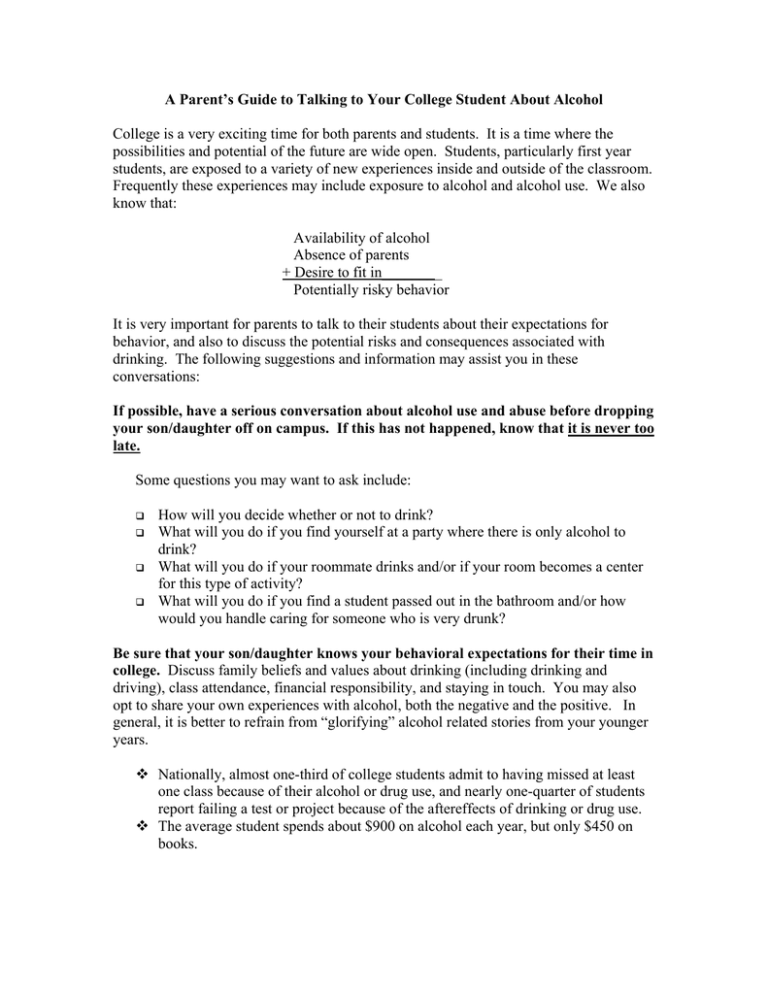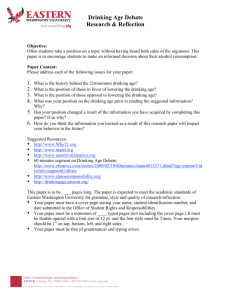
A Parent’s Guide to Talking to Your College Student About Alcohol
College is a very exciting time for both parents and students. It is a time where the
possibilities and potential of the future are wide open. Students, particularly first year
students, are exposed to a variety of new experiences inside and outside of the classroom.
Frequently these experiences may include exposure to alcohol and alcohol use. We also
know that:
Availability of alcohol
Absence of parents
+ Desire to fit in________
Potentially risky behavior
It is very important for parents to talk to their students about their expectations for
behavior, and also to discuss the potential risks and consequences associated with
drinking. The following suggestions and information may assist you in these
conversations:
If possible, have a serious conversation about alcohol use and abuse before dropping
your son/daughter off on campus. If this has not happened, know that it is never too
late.
Some questions you may want to ask include:
How will you decide whether or not to drink?
What will you do if you find yourself at a party where there is only alcohol to
drink?
What will you do if your roommate drinks and/or if your room becomes a center
for this type of activity?
What will you do if you find a student passed out in the bathroom and/or how
would you handle caring for someone who is very drunk?
Be sure that your son/daughter knows your behavioral expectations for their time in
college. Discuss family beliefs and values about drinking (including drinking and
driving), class attendance, financial responsibility, and staying in touch. You may also
opt to share your own experiences with alcohol, both the negative and the positive. In
general, it is better to refrain from “glorifying” alcohol related stories from your younger
years.
Nationally, almost one-third of college students admit to having missed at least
one class because of their alcohol or drug use, and nearly one-quarter of students
report failing a test or project because of the aftereffects of drinking or drug use.
The average student spends about $900 on alcohol each year, but only $450 on
books.
Stay in close contact with your first-year student, especially during the first six
weeks of the semester. The first six weeks of the semester are very important to
academic success. It is also a time period where students may begin to drink heavily,
which may interfere with their adjustment to college life and lead to feelings of failure.
Poor adjustment to college can also result in requests to transfer or drop out.
During the first weeks, you may want to ask your son/daughter questions like:
How is your roommate?
How do you and your roommate settle disagreements?
How do you like each of your classes?
Are you enjoying living in the residence halls?
Can you tell me a little bit about the friends you have made?
How are you spending your free time?
Are you feeling overwhelmed?
According to the National Institute on alcohol Abuse and Alcoholism (NIAAA),
one-third of first-year students fail to enroll for their second year.
Research indicates that one night of drinking can impair a student’s ability to
think abstractly for up to 30 days, limiting their ability to relate textbook reading
to class lectures.
Discuss the difference between low-risk and high risk drinking.
Low Risk drinking is:
Abstaining from alcohol.
Thinking about whether and what you will drink before the party.
Being 21 or older.
Eating a meal before drinking.
Always knowing what you are drinking.
Making arrangements to get home safely before you go out.
Drinking no more than one drink an hour for females, and no more than two drinks an
hour for males.
Alternating alcoholic beverages and nonalcoholic beverages throughout the night.
High Risk drinking is:
Drinking games, chugging, drinking anything out of a punch bowl, trough or funnel.
Drinking to get drunk.
Drinking too much too fast.
Leaving your glass unattended.
Not knowing what you are drinking.
Mixing alcohol with medications or illegal drugs.
Going to parties where people drink too much.
Share with your son/daughter some of the statistics and consequences of high risk
drinking.
About 1,400 college students die each year from alcohol-related unintentional
injuries.
Each year 600,000 college students have been assaulted by another student while
intoxicated, while 70,000 have been victims of alcohol related sexual assault.
110,000 college students have been arrested for alcohol-related violations.
High risk drinkers are 21 times more likely to: have engaged in unplanned sexual
activity, not used protection when having sex, fallen behind in school work,
damaged property, and gotten in trouble with campus police.
Encourage them to know and understand the on-campus consequences of violating
the College’s alcohol policy. Possible sanctions for being found in violation of the
alcohol and/or alcohol paraphernalia policies at Marist may include loss of priority
points, being placed on probation, monetary fines, removal from housing, mandatory
substance education classes, community service, or written assignments on top of regular
class work.
Encourage them to stand up for the right to a safe academic environment. Students,
who don’t drink, may still be affected by the drinking of others. Encourage your student
to deal directly with the person or problems that can result from another student’s alcohol
consumption. If they need assistance, encourage your student to speak with their Mentor,
RD or RA.
Know where to go for help. If you suspect your student is having a problem, encourage
them to seek help on campus. Good resources for assistance are the Counseling Center,
Health Services, Resident Directors, and First-year Mentors/Commuter Coordinator.
Your student may also talk to his or her academic advisor for assistance.
Signs that may indicate Alcohol or Drug use problems:
Missing or skipping classes (or assignments).
A significant change in academic performance.
Frequent requests for money to cover expenses, or taking a second job.
Moodiness, defensiveness, or silence when you try to talk to him/her about
school.
Resources
Center for Science in the Public Interest, Alcohol Policies Project. Information available
at: http://www.cspinet.org.
Facts on Tap. Information available at http://www.factsontap.org/collexp/Collexp.htm.
Illinois State University. Talking to With Your College Student About alcohol. Available
at: http://www.deanofstudents.ilstu.edu/crr/downloads/Talking_About_Alcohol.pdf
National Institute on Alcohol Abuse and Alcoholism. The Hidden Consequences of
College Drinking. Available at:
http://www.collegedrinkingprevention.gov/Parents/FactSheet.aspx.
National Institute on Alcohol Abuse and Alcoholism. What Parents Need to Know About
College Drinking. Available at:
http://www.collegedrinkingprevention.gov/Parents/default.aspx.
Truman State University. Most Dogs Don’t. Available at
http://mostdogs.truman.edu/parents.htm




